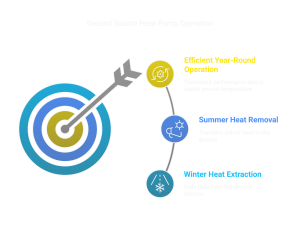Are you looking for a more energy-efficient way to heat and cool your home? A ground source heat pump (GSHP) might be the perfect solution. But how does a ground source heat pump work, and is it right for homes in Las Vegas?
In this guide, we’ll explain what GSHPs are, how they work, and why they can be a smart choice in the desert climate. We’ll also cover costs, benefits, and whether they are the right fit for your home or business.
What Is a Ground Source Heat Pump?
A ground source heat pump (GSHP) is a type of heating and cooling system that uses the stable temperature underground to keep your home comfortable. Unlike traditional HVAC systems, GSHPs don’t rely on burning fuel or using large amounts of electricity.
Instead, they transfer heat between your home and the earth. This makes them highly efficient, eco-friendly, and cost-effective in the long run. For more information, visit the U.S. Department of Energy website on Geothermal Heat Pumps.
How Does a Ground Source Heat Pump Work?
A GSHP moves heat rather than generating it. Here’s how it works:
- In winter, it pulls heat from the ground and moves it indoors.
- In summer, it removes heat from your home and transfers it into the ground.

Because the earth maintains a steady temperature, a GSHP can operate efficiently all year long.
How Does a Ground Source Heat Pump Work in Las Vegas?
Las Vegas has a hot desert climate, so you might wonder if a ground source heat pump is a good choice. The answer is yes!
Even though surface temperatures vary, the temperature underground stays between 50°F and 70°F all year. This allows a GSHP to work efficiently, even in extreme heat.
Why GSHPs Work Well in Hot Climates
| Feature | Benefit in Las Vegas |
|---|---|
| Underground Cooling | Avoids extreme outdoor heat |
| Energy Efficiency | Uses less electricity |
| Consistent Comfort | Provides steady cooling & heating |
Unlike air-source heat pumps, which lose efficiency in very hot weather, a GSHP stays efficient no matter how hot it gets outside.
Components of a Ground Source Heat Pump
1. Ground Loop System
This is a series of pipes buried underground. A fluid (usually water mixed with antifreeze) circulates through the pipes, absorbing and releasing heat.
2. Heat Pump Unit
This is the indoor component that moves heat between the ground loop and your home’s air system.
3. Distribution System
The heat pump connects to ductwork or a radiant floor heating system to distribute warm or cool air.
How Does a Ground Source Heat Pump Work to Save You Money?
A ground source heat pump may cost more to install upfront, but it provides big savings over time. Here’s how:
| Cost Factor | GSHP vs. Traditional HVAC |
| Upfront Cost | Higher (drilling required) |
| Monthly Energy Bills | Lower (30-60% savings) |
| Maintenance | Less frequent repairs |
GSHPs can cut energy use by up to 60% compared to traditional systems. Over time, these savings make up for the higher installation cost.
Pros and Cons of Ground Source Heat Pumps
Advantages
- Lower energy bills: Uses less electricity than traditional systems
- Eco-friendly: Reduces carbon footprint
- Long lifespan: Lasts 20-25 years (loops can last 50+ years)
- Quiet operation: No noisy outdoor unit
Disadvantages
- High upfront cost: Can cost $10,000-$30,000 to install
- Space needed for ground loops: Requires digging or drilling
- Longer payback period: Takes years to recoup the investment
If you’re planning to stay in your home for many years, a GSHP can be a great investment.
How Much Does a Ground Source Heat Pump Cost in Las Vegas?
The cost of installing a ground source heat pump varies based on your home’s size and the type of ground loop system used.
| Home Size | Estimated Cost |
| Small Home (1,500 sq. ft.) | $10,000 – $15,000 |
| Medium Home (2,500 sq. ft.) | $15,000 – $25,000 |
| Large Home (4,000+ sq. ft.) | $25,000 – $30,000 |
You may also qualify for federal tax credits and local rebates, which can lower the cost significantly. Check out Unlocking Savings: Guide on Receiving Tax Credit for Heat Pump if you’d like to see what is required to qualify.
Is a Ground Source Heat Pump Right for Your Home?
Before investing in a ground source heat pump, consider these factors:
- Yard space: Do you have enough land for the ground loops?
- Budget: Can you afford the upfront cost?
- Homeownership plans: Will you stay in your home long enough to see the savings?
- Eco-conscious goals: Do you want a greener home?
If you answered yes to most of these, a GSHP could be a smart choice.
Conclusion
So, how does a ground source heat pump work? It efficiently transfers heat between your home and the ground, keeping your space comfortable while saving you money.
If you’re in Las Vegas and want to invest in an eco-friendly heating and cooling system, Doctor Heat Pump can help! Contact us today to learn more about GSHP installation and find out if it’s the right fit for your home or business.






